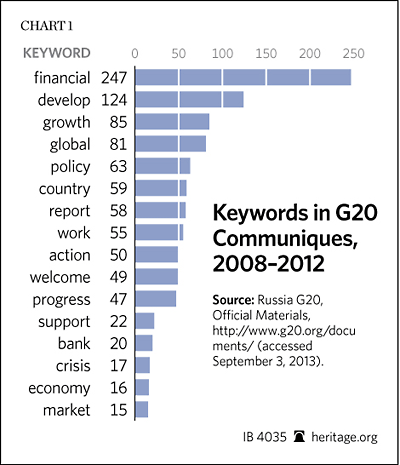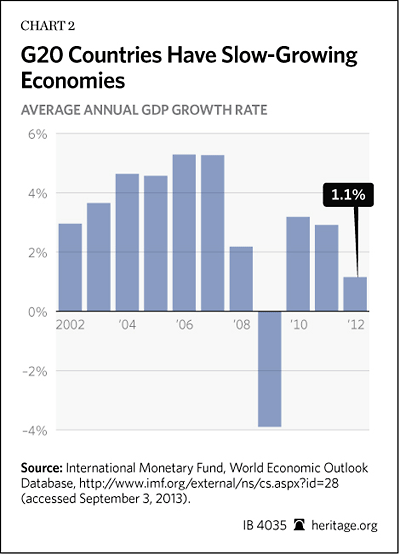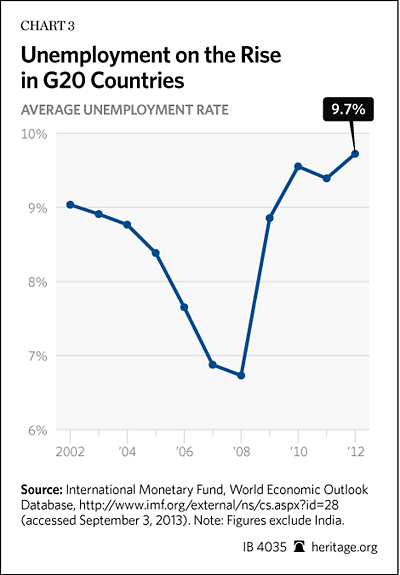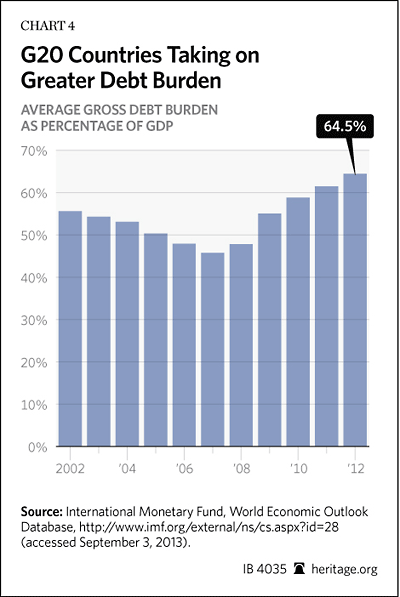When President Obama travels to St. Petersburg, Russia, for the G20 summit on September 5–6, he will confront an agenda chock full of issues that are not directly relevant to restoring optimal conditions for global economic recovery and growth.
Although many pressing geopolitical issues, such as the crisis in Syria, will demand some attention from the gathered heads of state, President Obama should insist that the G20 agenda be de-cluttered. Distracting items presently on the agenda at the Russia summit—from financial literacy and money laundering to energy sustainability and “Global Marine Environment Protection”—that are not germane to restarting global economic growth should be dropped from the G20 program, permanently, so that they can be considered more comprehensively in their appropriate fora. Then the President and the other G20 leaders can spend their limited time together on fostering a climate conducive to risk-taking, entrepreneurship, human capital formation, and hard work.
Mountains of Words
As the graphic below shows, G20 summit meetings since the first one during the 2008 financial crisis have been long on words—mountains of the same words—but short on accomplishments.

Economic growth in the G20 countries has declined to less than 2 percent on average.

Meanwhile, G20 unemployment rates have risen to an average of nearly 10 percent (and that does not include those workers who have become discouraged and have dropped out of the labor force).

And G20 sovereign public debt has soared to an average of about two-thirds of gross domestic product.

At the G20, leaders will no doubt discuss the need for economic growth and employment. They will mention the desirability of structural economic reforms to produce prosperity rather than state-directed efforts to manipulate demand to achieve growth. They will restate their commitment to a free and open global trading system while opposing protectionist measures and competitive exchange rate devaluations. Nevertheless, government-centric issues will have a higher profile at the G20. Buzzwords such as “financial safety nets,” “rebalancing global demand,” “global infrastructure gaps,” “financial inclusion,” and “inequality” will likely make appearances.
Debt is another area that will get the wrong kind of attention. In the U.S. alone, federal government debt has nearly doubled since President Barack Obama took office, yet G20 leaders will spend their time discussing topics such as “Government Borrowing and Public Debt Sustainability,” where the focus will be not on reducing the need for more borrowing by cutting government outlays but on how to manage even higher levels of debt to fund unsustainable pet spending programs justified by a misapplication of Keynesian economics.
A pro-growth G20 tax policy would seek to minimize the inevitable economic distortions that are caused by all taxes. Yet rather than concentrating on reducing the need for more taxation by cutting government spending, G20 leaders will be asked to focus on tax avoidance, “base erosion and profit shifting.”[1] In other words, G20 leaders will be asked to devise creative new ways to tax so they can continue spending.
Cronyism, G20 Style
Organizers of the St. Petersburg summit have sought political legitimacy for G20 actions and recommendations through engagement with various groups that meet in advance of the G20 summit. For example:
- “Business 20,” which represents the international business community;
- “Labour 20,” which consists of elected representatives of trade unions from G20 countries;
- “Think 20,” which is comprised of “the world’s leading think tanks’ representatives”;
- “C20,” which contains representatives of civil society; and
- “Y20,” which consists of young participants from G20 and other countries.
Left unaddressed by the organizers is the key question of who decides which companies, unions, think tanks, civil society groups, and young leaders are invited to participate. What about the hundreds of millions around the world who were not invited to share their views? Who speaks for them? And do those few from the groups who are privileged to attend the G20 thereby gain an unfair advantage through access to world leaders? That is practically a working definition of cronyism.
It is all the more ironic since one of the many subjects covered in the G20 process is corruption. The G20 Anti-Corruption Working Group “covers a broad range of issues, including impact of corruption on economic growth; measures against foreign bribery and solicitation; combating money laundering and recovery of proceeds of corruption; whistleblowers protection; asset disclosure and conflict of interest regulation; cooperation with private sector and civil society in fighting corruption.”[2]
Economic freedom rests on the empowerment of the individual, nondiscrimination, and open competition. None of these requirements can exist in a society that lacks effective rule of law. The cronyism engendered by the many G20 groups undermines it.
Make It Useful
The G20 meeting should not be just another exercise directed by the world’s senior civil servants aimed at getting their bosses’ blessings for continued work by international organizations. Instead, G20 leaders should address the growing number of threats to global economic freedom that have accompanied stagnant global economic growth and persistently high unemployment.
The Heritage Special Report “2013 Global Agenda for Economic Freedom”[3] would provide G20 leaders with subject matter for a more profitable use of their time to promote free flows of capital, goods, services, people, and ideas around the world and adopt the revitalizing policies of economic freedom that are essential to creating good new jobs for the citizens of G20 countries.
—James M. Roberts is a Research Fellow for Economic Freedom and Growth and Ryan Olson is a Research Assistant in the Center for International Trade and Economics at The Heritage Foundation.



